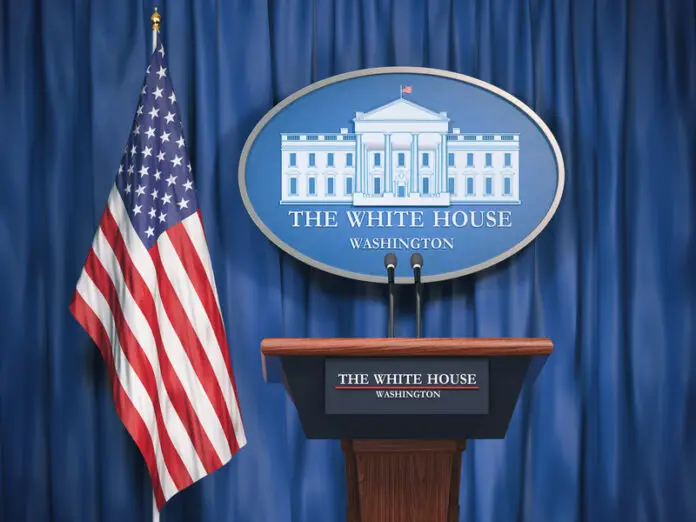White House Press Secretary Karoline Leavitt faced intense questioning during her Monday press briefing as she attempted to defend the Trump administration’s position on hospital care for undocumented immigrants amid the ongoing government shutdown. The confrontation highlighted the administration’s controversial stance linking immigration policy to healthcare funding during the budget standoff that has entered its second week.
During the October 6, 2025 briefing, Leavitt was directly asked whether the Trump administration believes hospitals should be exempt from treating undocumented immigrants who arrive at emergency rooms. The question came as part of broader discussions about the administration’s justification for maintaining the government shutdown, which Republicans have blamed on Democrats’ demands to extend Affordable Care Act subsidies.
Leavitt repeatedly argued that Democrats had shut down the government to provide federally funded healthcare to undocumented immigrants. However, federal law already prohibits undocumented immigrants from receiving federally funded healthcare through programs like the Affordable Care Act and Medicaid. The Democratic push centers on restoring access to health programs for certain legally present immigrants who are not citizens, not expanding coverage to undocumented individuals.
The press secretary maintained that President Trump was not engaging in negotiations with Democratic leaders. When asked about potential discussions, Leavitt stated that Trump’s position was very clear and that there was nothing to negotiate. She confirmed that Trump had spoken with House Speaker Mike Johnson and Senate Majority Leader John Thune but had not communicated with congressional Democrats since meeting with House Minority Leader Hakeem Jeffries and Senate Minority Leader Chuck Schumer just before the shutdown began.
The briefing occurred as the administration escalated pressure tactics, including threats of mass layoffs rather than traditional furloughs. Leavitt warned that the administration would soon have no choice but to fire federal workers en masse, a departure from previous shutdown protocols during Trump’s first term that resulted only in furloughs. She indicated that the timing of potential layoffs would depend on the outcome of Senate votes on funding measures.
When pressed about the rationale for layoffs instead of furloughs, Leavitt deflected blame to Democrats, arguing that conversations about layoffs would not be happening if not for what she termed the “Democrat shutdown.” She explained that since the government was not receiving cash, officials had to examine the balance sheet and act as good stewards of taxpayer dollars.
The confrontation came amid broader constitutional questions about the administration’s funding decisions. On October 7, 2025, the White House announced plans to use tariff revenue to maintain the Special Supplemental Nutrition Program for Women, Infants and Children during the shutdown. Leavitt announced that Trump had authorized using Section 232 tariff revenue to sustain WIC, which serves approximately seven million low-income mothers, pregnant women and young children.
The WIC funding decision raised questions about executive authority over federal spending. The program typically operates with an appropriation of $7.6 billion annually, making its weekly cost approximately $146 million. The administration described the tariff revenue transfer as a creative solution developed by the Office of Management and Budget, though officials did not specify how long the funding would last or whether additional transfers would be needed.
Constitutional experts noted concerns about the president’s authority to redirect tariff revenue without congressional approval. The Appropriations Clause of the Constitution gives Congress the “power of the purse,” and the administration’s unilateral reallocation of funds represents a departure from traditional separation of powers principles.
Meanwhile, the administration faced additional scrutiny over federal worker back pay. A draft White House memo argued that furloughed federal workers might not be entitled to back pay after the shutdown ends, despite a 2019 law requiring retroactive compensation. The Government Employee Fair Treatment Act of 2019 mandates that all federal employees, whether furloughed or working without pay, must receive back pay after a shutdown concludes.
The memo suggested the White House interpreted language in the law requiring payment “subject to the enactment of appropriations Acts ending the lapse” to mean Congress must specifically appropriate back pay funds. This interpretation conflicts with the Office of Personnel Management’s September guidance confirming federal workers would receive retroactive pay.
Senate votes on both Republican and Democratic spending proposals have failed multiple times, with Democrats insisting on including extensions of Affordable Care Act subsidies affecting more than 20 million Americans. The subsidies are set to expire at year’s end, and Democrats have made their renewal a condition for supporting any short-term funding measure.
The American Federation of Government Employees criticized the administration’s back pay position as an obvious misinterpretation of the law. Union President Everett Kelley emphasized that federal employees’ livelihoods should not serve as bargaining chips in political negotiations.

